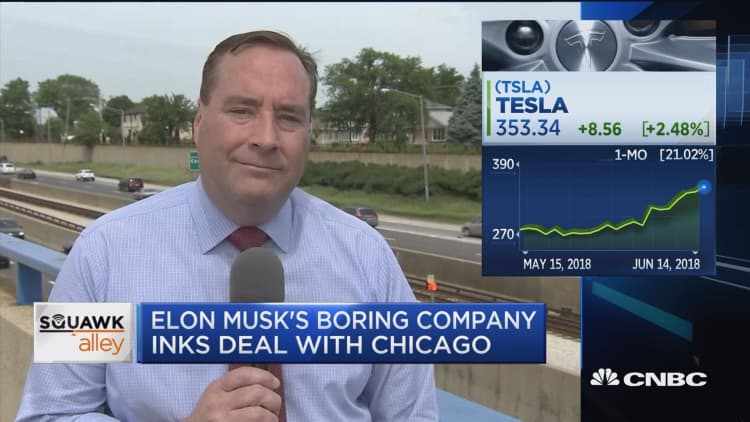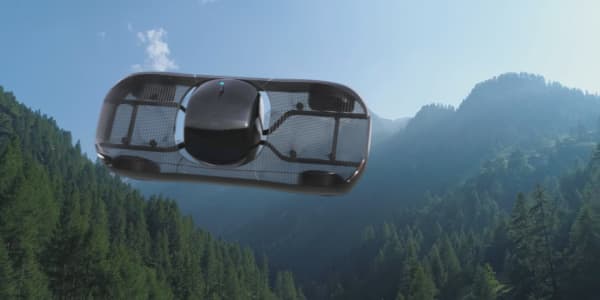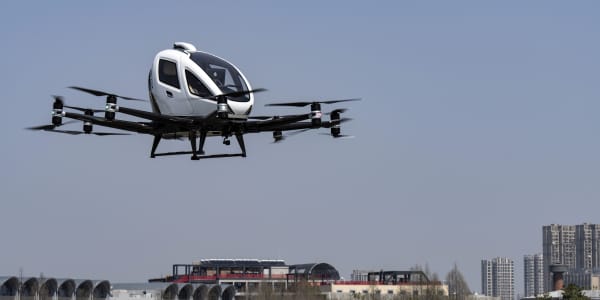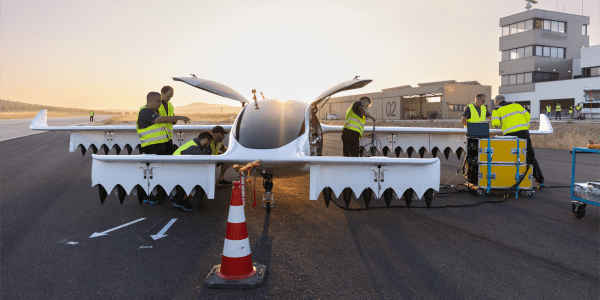Elon Musk spares no opportunity to remind the world that everyone is out to get Tesla — from the media and the hedge fund shorts to labor unions and fossil-fuel companies.
Now there is another entrenched interest group that is showing the first inklings of potential to become another “unfriendly” force in the world: Cabdrivers.
The far-thinking billionaire entrepreneur and innovator has plans to develop a high-speed tunnel transport service between downtown Chicago and O’Hare Airport. Some taxi drivers, already facing dire financial pressures due to the rise of Uber and Lyft and other on-demand ride services, say a high-speed transport option to the airport would all but kill them.
“If you could get to the airport in 12 minutes, would you still take a cab? If they build this tunnel, it will kill the industry,” said William Washington, 69, a Chicago cabbie with more than 35 years of experience.
In June the Boring Company won the bid to connect Chicago’s Loop and O’Hare International Airport. Currently it takes Chicagoans about 45 to 50 minutes to get from downtown Chicago to O’Hare by the L train, the city’s public transit system. The only alternative is for Chicagoans to take a taxi or a ride-hailing service like Uber, Lyft or Via, which can take even longer.
Chicago Mayor Rahm Emanuel has chosen Musk’s infrastructure and tunnel company to construct the underground high-speed train that would carry up to 16 riders from Chicago’s Loop to O’Hare in approximately 12 minutes. Using high-powered electric “skates,” the transit system proposes to hurtle passengers at 150 miles per hour. Musk also is behind the Hyperloop project that plans to build a high-speed transportation service between Los Angeles and San Francisco and has also been exploring a similar project in Maryland.
The Boring Company did not return multiple requests for comment.
Already battling the threat from Uber, Lyft
Musk indicated at the time of the Chicago announcement that fares would not be equivalent to the cost of taking the L train, which is $5 per way, but would be less than the cost of a cab ride or ride-hailing service, which can cost from $30 to $45, on average. As the talks continue, Chicago’s transportation industry is gearing up to fight for their seemingly soon-to-be thinner stake in Chicagoan ridership.
Annual ridership to O’Hare via cab has already plummeted 21 percent over the last three years, according to public data sets released by the city of Chicago and Airports Council International, the global trade representative of the world’s airports. The slump in taxi pickups is largely a result of Chicago’s declining taxi industry. A report by the Chicago Cab Drivers Union found that the number of riders in Chicago hailing cabs dropped from 2.3 million monthly riders to about 1.1 million from 2014 to 2017. The decline caused a dip in drivers’ revenue by an average of 40 percent.
The current problem has the labor union that represents taxi drivers focused on the immediate threat — the on-demand car services — rather than any longer-term threat from The Boring Company's futuristic project. Though comments from a local union spokesman overlook the sentiment that individual cabbies in Chicago expressed to CNBC.
“Quite honestly, drivers in Chicago are not worried about Elon Musk’s plan; they’re worried about making their lease this week," said Tracey Abman of local union AFSCME 31. "The gravity of the situation that cabdrivers find themselves in today is so dire, we’re less concerned about how a proposed high-speed train will affect drivers and more focused on the destructive policies created by the city,” Abman said.

For now, the unions and drivers agree on one thing: The city deserves to be a focus of attack.
The Chicago mayor’s office said it has been working hand-in-hand with the city’s taxi industry, reducing tight orders to help taxi drivers compete with ride-sharing services. Earlier this year, the mayor’s Business Affairs and Consumer Protection Department extended the age of vehicles on the street, loosened meter requirements and reduced inspections on newer vehicles in an effort to ease regulation. But it is unclear whether Emanuel has a detailed strategy to protect the fragile industry from the forthcoming, innovative transit system.
“Supporting all transportation industries is important to us. We don’t assume addition requires subtraction. We remain committed to having open dialogue with the industry, including exploring reforms to further reduce the regulations on taxis,” Grant Klinzman, an administrative spokesperson from the mayor’s office, told CNBC via email.
Taxi driver Washington was not convinced. “It’s a stab in the back to the taxi industry. He doesn't even have a clue how we have to make a living for our families,” Washington said, referring to Emanuel’s initiatives.
An industry 'left in limbo'
Harry Campbell, author of "The Rideshare Guide," said he doesn't think the high-speed tunnel will act as a direct competitor to ride-hailing apps in the same way the apps have hit Chicago’s taxi industry. That is because of the tunnel’s design as a one-stop destination. But Campbell, also known as the Rideshare Guy, expects drivers will be angry to lose out on profitable trips to and from O’Hare.
“I think that, as you might imagine, it’ll definitely be sort of a superior experience to traveling by car,” Campbell said, adding, “Drivers won't be happy at the thought of this new option, because airport trips are lucrative for drivers because they’re a little longer."
Some Chicago cabbies are hopeful that Uber drivers will lose the most. “From a cabdriver’s perspective, it’ll be kind of humorous to watch Uber and Lyft, who’ll probably lose the most, go to battle and say, ‘Wait a minute,’” said veteran St. Paul cabbie John Shannon, who hosts the podcast The Taxi Stand Hour. “While I’m never going to invite an Uber driver to dinner anytime soon, I do kind of feel for them a little bit,” Shannon said.
Uber, Lyft and Via did not respond to requests for comment.
With infrastructure key to future economic growth, some urban experts spoke optimistically about The Boring Company’s initiative.
“I think it’s a win for everyone," said Lucius J. Riccio, a lecturer at Columbia University’s School of International and Public Affairs and former commissioner of NYC’s Department of Transportation.
"I don’t think you can name one single major infrastructure effort that has hurt transportation. Every time we built a highway, it’s encouraged development, growth and economic opportunity. More people will want to go to do business in the city, because it will be easier to access,” Riccio said.
He said that despite the potential handover of revenue, he predicts taxi fleets and ride-hailing services will profit if Musk’s transit system decongests highways, allowing cars to travel more efficiently with less traffic.
“He’s on the right track for what Chicago and other cities need,” Riccio said.
The Boring Company’s high-speed train “would be able to handle 2,000 passengers per hour in each direction,” or about 60 percent of Chicago’s Blue Line mostly-under-capacity average hourly ridership, according to a report in the Chicago Tribune. For comparison, a crowded New York City subway train can fit the same amount of passengers. An entire subway line can handle 24 of those trains per hour.
“It’s not really managing the problem. It’s just providing an alternative,” said UCLA professor of urban planning Brian Taylor, who also expects this project to be a long time coming. “It’s sort of like when you have an interesting breakthrough in the lab, which might take 10 years to complete.”
Even with Mayor Emanuel’s endorsement, Musk has to gain approval from the Chicago City Council. The council would be trusting The Boring Company to complete its first project for public transportation to date. Until the council makes its decision, Chicago’s transportation industry will be doing more of the same: worrying about its future.
"Again, we're left in limbo. Without a doubt,” Washington said.






